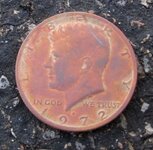King Ghidorah
Jr. Member
I have recently started metal detecting an old farm site that has been in the family for 200 years. I've had some insane luck finding coins from 1850s-1950s. The soil is very compact and the coins are coming out with incredible detail. Unfortunately I scratched an indian head penny and barber dime digging them out. I've been using the T Lesch shovel to dig. Not sure if it was the shovel or rocks in the compact soil that caused the scratches. Anyone have tips or a process they follow when digging to ensure they don't cause damage to the coins?
Thanks
Thanks
Upvote
0






